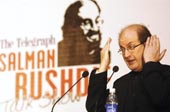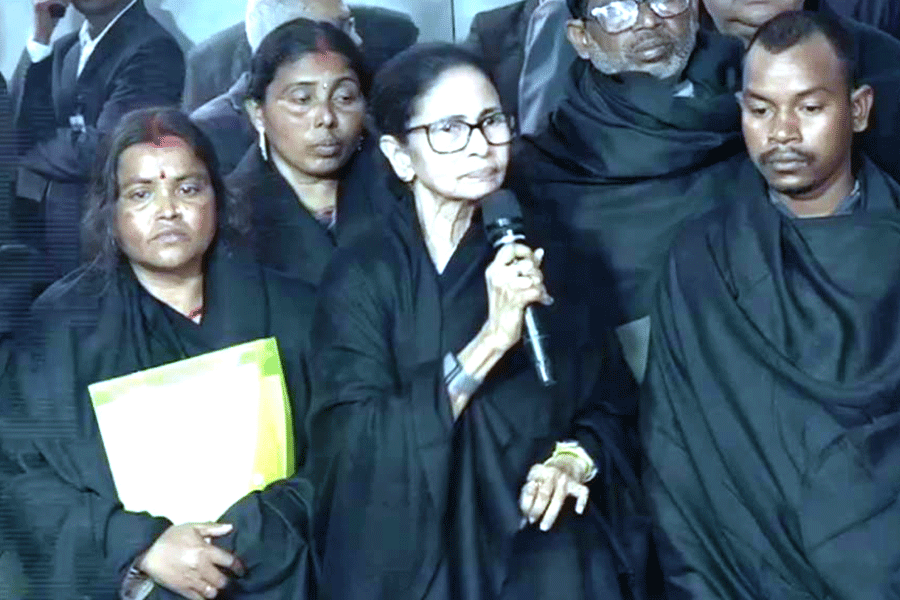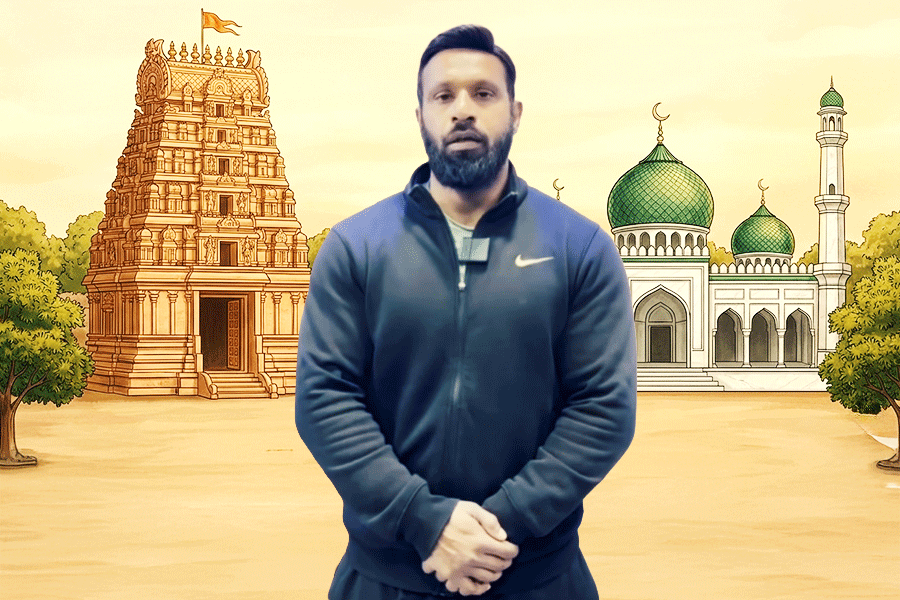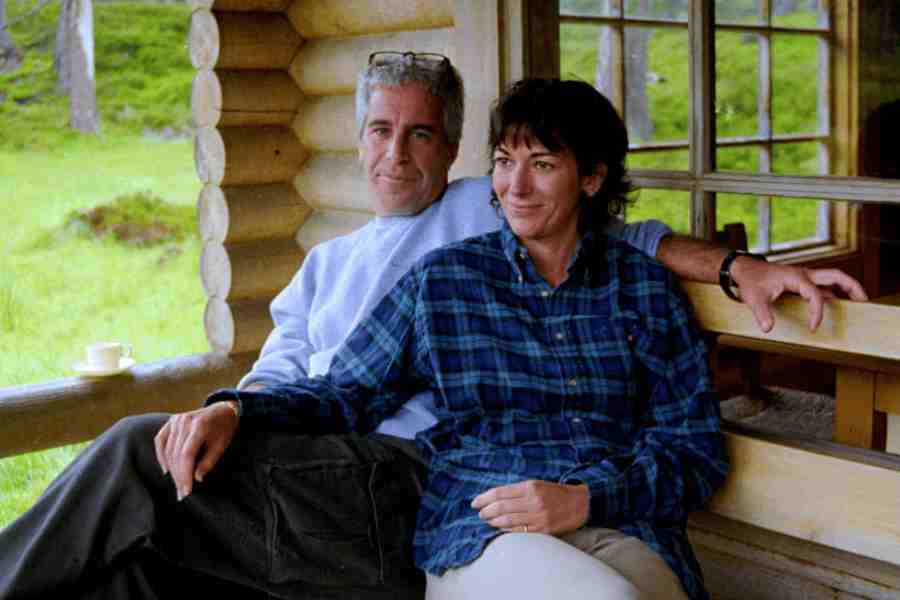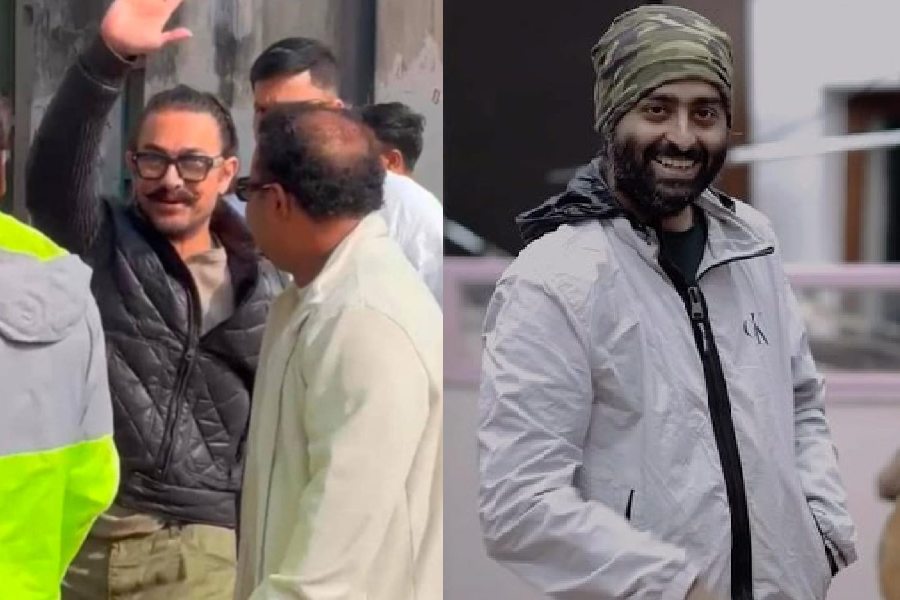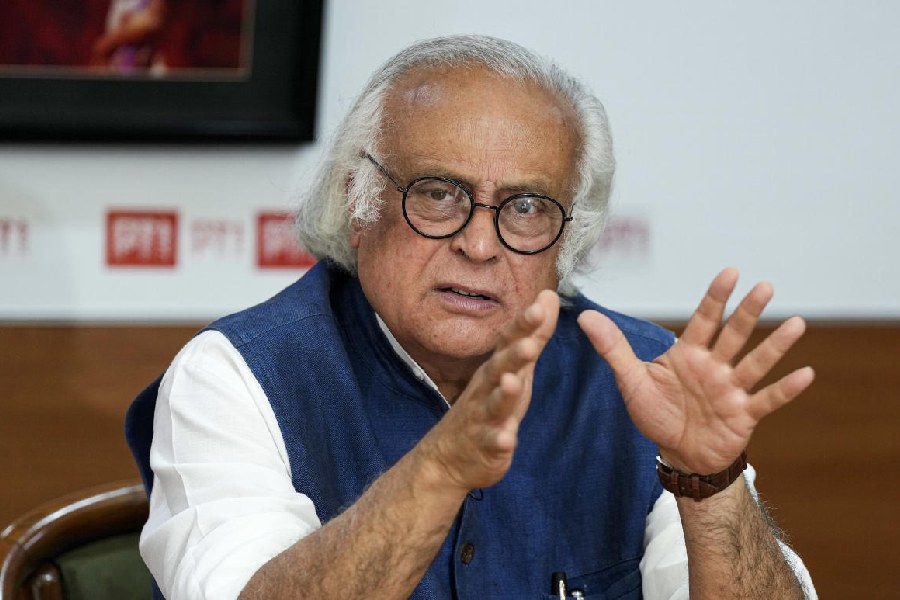 |
The shadow has lifted over Salman Rushdie. He doesn?t want police protection. He hates the pilot car?s blaring siren. He is at ease in public, chatting with readers and signing autographs. He strides through north Calcutta?s narrowest bylanes, climbs up the most precarious of staircases to visit one of the city?s oldest bookstores.
Rushdie has lived through a fatwa, 10 years in exile with a heavy price hanging over his head. At 57, he seems comfortable in his own skin.
He even shed the 16-year-old beard two months ago, finally paying heed to wife Padma Lakshmi?s long-standing grouse. ?I am now getting reacquainted with the lower half of my face,? smiles Rushdie, who left Calcutta on Saturday morning after three days in the city. ?But my seven-and-a-half-year-old son Milan wants it back. Children are very resistant to change.?
Stillness has consistently evaded the Mumbai-born, New York-based writer?s life. He is acutely conscious of the physical marks left by a life?s battles. ?A TV channel recently made a biography on my life. They unearthed some really old footage. Seeing that was most difficult. Most noticeably, my voice has changed. My accent also seems more upper-class British now,? he admits. The show was ?20 years early?, as far as this prolific author is concerned. It felt too much ?like an obituary?.
Rushdie, however, is not given to sentimentality. Far from it. He firmly states that the period in exile has been left far behind. ?Padma, who I have been with for around five years now, has not seen that part of me. She has heard about it, but never experienced it,? he points out.
The Booker-of-Bookers has regained his freedom of movement almost fully. ?I feel safe enough to travel quite freely? But I won?t be planning a holiday in Iran anytime soon,? he says, irony seldom far from his tongue.
This Calcutta visit was his third trip to India in a year. While the attention around the trips may be dying down, his face is too recognisable for him to walk around incognito. He did venture into bustling areas like Mumbai?s Crawford Market, which made quite a few people nervous. ?It was fine. But Padma standing beside you is like having a floodlight pointed straight at you,? he laughs.
Mumbai would logically find the Cambridge-educated man at his most relaxed. ?The moment my parents sold the house in Mumbai changed my life,? he admits. Rushdie?s parents moved to Karachi in their old age, to be closer to family. ?Karachi is a shock to the system? If the choice was between Mumbai and London I would have chosen Mumbai. But when the choice was between Karachi and London, I chose London,? he relives.
So London it was, which is where he penned Midnight?s Children, while working in advertising to make ends meet. He spent six months travelling around India, to the places he touched upon in his second novel and his first major work. ?Then it took me around three years to find a way to write it,? he recounts. It was five years in the pipeline. That was also the last the advertising industry saw of him.
 |
Though he has now moved to New York, Rushdie spends a significant amount of time in London to be with his sons, Milan and the 25-year-old Zafar. An 11-year-old Zafar had inspired Rushdie to write his children?s book, Haroun and the Sea of Stories. The short sentences and simple language swayed the way the writer viewed communicating with his reader. ?I want to write in ways that minimise the obstacles to the reader without turning it into banality.?
It is not surprising to find family so deeply ingrained in Rushdie?s work. As he noted at The Telegraph Talk Show on Thursday, family is the beginning of all stories. ?The ordinary family is a myth? Every family has its stories.? Knowledge of the treasure of tales ? for new entrants like a spouse or a child -- that belong to each family is ?proof of membership?. Then when you die, you become a family story. ?That becomes man?s little bit of immortality... Remember old uncle Salman? He got into a bit of trouble once??
Interestingly, it is Haroun? that bears evidence of Rushdie?s deep admiration for Satyajit Ray. Goopy and Bagha became the names for rhyming fish in the tale. Back in Ray?s city after 22 years, he paid a visit to a place that saw the birth of some of the auteur?s ideas ? the College Street Coffee House. He walked through the bookstall-lined streets. ?It is very interesting to see a book district like this? It is like Calcutta?s version of the Paris book district Balzac describes.?
Autograph hunters are proof of the author?s enduring popularity (?in Calcutta, unlike other Indian cities, the writer seems to matter more than the media myth?, he observes). At Das Gupta, Rushdie is ?one of the first names salesmen learn?, according to Arabinda Das Gupta, director of the legendary bookstore he visited on Friday morning. At Rupa, Rushdie is happy to see all but one of his titles proudly on display.
He hasn?t approached the government about lifting the ban on Satanic Verses. ?It was really so long ago? 1984? It just seems silly now, with it being freely available in most other countries,? feels the writer. ?The BJP government wasn?t eager to do anything about it and, quite frankly, it was the Congress government that banned it in the first place.?
With Shalimar the Clown hitting the shelves later this year, fans disappointed by the deprivation have something to look forward to. And the man who pens at least 600 words everyday (?even on bad days, and believe me, there are so many?) isn?t likely to slow down soon. To him, ?man is a storytelling animal?, and the novel is far from dead.
'When I am writing, I tend not to read a lot of fiction. I read poetry, as it teaches you to pay attention to the language, because that?s what poetry does. It reminds you that a reader reads sentence by sentence. It is easy to forget that while writing a novel, as it takes so long to write anyway...
I don?t read to keep up anymore. I stopped reading in that way, and have been reading more and more of the classics. I read now for pleasure
If you are going to use surrealism it has to grow out of the real world. It can then be used as a metaphor. Writers like Dickens could create a surrealistic foreground set against a naturalistic background, which is useful
Reading favourites
Philip Roth
The late burst has been the best writing he has done. His last four or five novels have been his best
Gunter Grass
I grappled with The Tin Drum through college. Then I finally read it and understood it later. Sometimes, you are too young for a book. I am an admirer
Balzac
While writing Fury, Balzac was the most useful. He creates a town, a neighbourhood in a town, a street in the neighbourhood, a house in a street, a room in a house and then the person in the room. By that time, you can really understand her because she has been completely contextualised.
Christopher Logue
He is an English poet, not world famous. He has been writing his versions of the Iliad that have become a sensation suddenly. It is just astonishing. It is very contemporary poetry that engages a very classical subject.
 |
Anita Desai
Amongst Indian writers she is my closest friend. I haven?t read her latest book, but I have it, it is sitting there and judging me. I am very interested to see where she goes, as this is the first time she is moving away from India.
Vikram Chandra
I really like his stuff.
Suketu Mehta
Liked Maximum City a lot? at the level of reportage and also because it is very well-written.
Manto
I always loved Manto. I have always wanted to write a book about him. Maybe he would even appear in it! He had a fascinating life, and then of course, he managed to drink himself to death.

